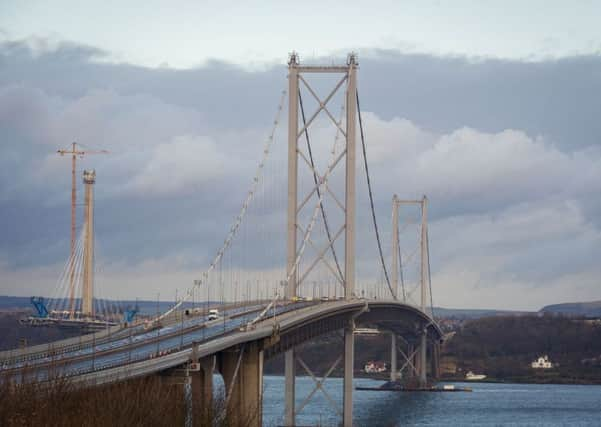Brian Monteith: No such thing as a free bridge crossing


If we didn’t need to pay for teachers, if we didn’t have to pay for people that clean up after us, collect our refuse or police our streets we wouldn’t have to pay council tax. Why, we wouldn’t need all these tax collectors either, they could be doing more useful things, like looking after old folk, or teaching kids to count.
Farmers could simply grow their crops and raise their livestock and provide them for free – but would receive everything they consume for free, too. Surely we would all be winners?
Advertisement
Hide AdAdvertisement
Hide AdActually it’s a barmy idea, the stuff of nonsense. As Nobel Laureate economist Milton Friedman famously said: “There ain’t no such thing as a free lunch” – and his adage does not just hold for eating out. Everything has its price, including some things where the price is negative.
Unfortunately, many of our politicians live in this strange world where things can be ‘’free” and when they shout their daft ideas for the next “free” thing too many of us are willing to go along with their proposal. That might be because we will be the beneficiaries of the “free” goods or services, but sometimes when we shall not benefit from their munificent largesse we still go along with the idea because it seems to make sense.
In such circumstances I wager it’s because we have only considered the supposed upsides of making something free, rather than the downsides.
A wonderful example of how easily we are seduced into believing “free” is good or having prices is bad confronted us this week when the Scottish Parliament started to take evidence on the closure of the Forth Road Bridge in December.
Advertisement
Hide AdAdvertisement
Hide AdNow, make no mistake, this was an economic disaster for Edinburgh, Fife and the Lothians as well as Scotland more generally.
I know of major retailers at locations like the Gyle and Livingston who released staff because their business was down by more than ten per cent at the height of the Christmas season. December is an expensive time for everybody and not having the expected income will have put people in serious debt or unable to meet their financial obligations. That’s just some of the human cost of the bridge closure.
Then there were all the extended journeys that cost people more and the journeys cancelled that have disrupted people’s lives. There will have been personal problems caused by that as well as the economic impact to people or local businesses. So let no-one say it was not economically damaging – it was, and somewhere an economist will be working out a reasonable guesstimate to put a number on that cost.
We also need to realise that the cost of the disruption continues to this day, for the Forth Road Bridge is not fully open, it is only open to cars but lorries are not yet able to use it – and we are now at the end of January. Just when will the bridge be fully open and not continue to cause economic dislocation to the delivery of goods products?
Advertisement
Hide AdAdvertisement
Hide AdSo, we have a bridge – a key link in the nation’s economic infrastructure – closed for repair . . . what’s that got to do with the concept of making things “free”? It’s simple, the bridge would never have been closed to all traffic in December and still closed today to heavy goods vehicles if politicians – in their effort to win our favour – had not proposed and then introduced “free” use of the bridge back in 2008.
It sounded great at the time, but speaking to the parliament on Wednesday, Councillor Lesley Hinds, who was chairwoman of the Forth Estuary Transport Authority, the idea had not been thought through properly. What we now know – because those responsible for maintaining the bridge have coughed up – is that the abolition of the tolls meant tightening finances for bridge maintenance.
This was then added to by Scottish Government financial restraints introduced the year that the bridge’s cracked truss ends were planned for repair. At that point the repairs were delayed and subsequently never done before the bridge had to be closed when it became unsafe in December.
The reason the tolls had existed was not just to fund the building of the bridge by those that used it, but to pay for the ongoing maintenance required after that initial capital cost had been met. To politicians wanting to get elected it was a no-brainer – reducing the cost to zero of those crossing the bridge (who probably voted in the constituencies of those advocating the bridge becoming free) and passing that cost on to the rest of the nation, wherever they live and whether or not they drive.
Advertisement
Hide AdAdvertisement
Hide AdBut the politicians never thought it through. They never made up the loss of income from the tolls. Instead, they moved on to advocate more freebies, such as free prescriptions for those who were happy and able to pay for their medicine.
To paraphrase the great Milton Friedman: “There ain’t no such thing as a free bridge crossing.”